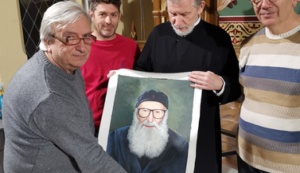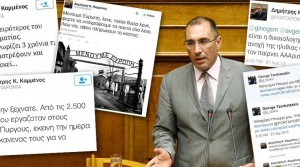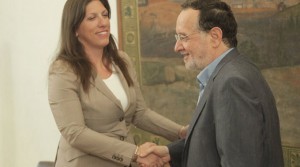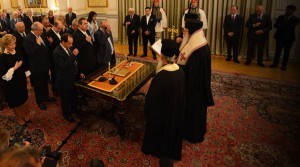In a turbulent world, where the haze from news of wars and the disorder that abounds across the globe has spread everywhere, the message of the beatitudes – “Blessed are the peacemakers for they shall be called children of God” – that were spoken during our Lord’s sermon on the Mount of Olives seems more timely than ever before.
Threats from international superpowers that are spending billions annually on weapons – and unfortunately, not on the eradication of poverty or supporting education and culture – bring disorder to our world and cast a shadow of hopelessness and despair, affirming the prevalence of evil in this world.
During my recent research studying texts written by the ever-memorable Archimandrite Fr. Eusevios Vittis, who served the Holy Metropolis of Sweden as a missionary and is remembered as a charismatic, devout, and virtuous clergyman, I discovered letters written by the Elder to members of the Greek Community of Scandinavia, where his pastoral concern and theological position on the phenomenon of evil in the world is evident.
Fr. Eusevios would end with the following conclusion in each of his sermons published in the anthology, entitled “Κάθε μήνα – Ἕνα γράμμα γιά σένα” (A Letter for You Each Month), as follows: “I send you my greetings. With much fervent love, your brother Helladios.”
The Elder used the pen name “Helladios” during the early years of his stay at his hermitage in Rättvik, Sweden, as part of his systematic effort to avoid publicity. I cite a translated version of the Elder’s sermon on this issue and consider its message current and timeless, as it emulates the example set forth by our Lord, Whose Gospel remains “the same yesterday, today and unto the ages.”
Below is a current from every aspect – sermon by Elder Eusevios, on the Nativity; a true and genuine Priest, who fell asleep in righteousness:
“As we read the history of the events connected with the birth of Jesus, we stop in amazement, but also filled with righteous indignation over one particular event: The slaughter of the innocent infants of Bethlehem (Math. 2:16). Overcome by his blind madness over fear of losing his throne, Herod killed all the infants of Bethlehem and its surrounding areas! He thought that he would surely kill his supposed opponent in this manner. And here is where one’s justified bewilderment comes about. What did the innocent infants do to deserve being killed for no reason? What did their poor mothers do to deserve to lose them from their embrace in such an inhumane manner? And why did God allow this terrible injustice and unheard of crime to take place?
This natural and completely instinctive question can be expanded to include all the pain suffered by innocent people and all the injustice taking place in this world. And to go even further: the existence of evil – whether indeed or thought – in this world. For example, why are there children who suffer from disabilities? Why are there victims being oppressed under dictatorships and authoritarian regimes? Why are there countless victims of natural disasters? Why are there wars? Why?…Why?… Does God not see all this? And if He does, why does He not intervene in time? Why does He tolerate the existence of evil? Where is His justice, providence, and love? Is it possible that all these concepts are merely fantasy? Perhaps there is not even a God who cares for our harsh fate? These questions are truly relentless and could go on ad infinitum.
You and I are not the first ones to pose them. They preoccupied and scandalized the hearts of people from the beginning of time. Not merely as a theoretical dilemma that certain people grappled with from their offices, but as a life problem, a terrible and tragic personal test, an unspeakable tragedy afflicting countless lives. Many powerful minds were preoccupied by this problem and thousands of pages were written about it containing invaluable thoughts in their attempt to clarify the matter and reach some sort of answer. It would be ridiculous, if not downright foolish, to try to respond to this issue in the very limited space at our disposal. However, I will try to formulate that which my meager faculties and the limited space allow, pointing out several views which I hope will enable us to ponder this matter illuminated by faith.
Religious thought and life experience approaches the matter of evil and pain from various standpoints. I indicatively mention only the famous Book of Job from the Old Testament and Psalms 36, 48, 72. Their sacred authors do not hesitate to express their poignant questions in the most emphatic and frank manner. “But as for me, my feet were almost gone; my steps had well nigh slipped,” says the Psalter. I was shaken. I nearly fell into the abyss, into the bottomless pit of unbelief and godlessness as I was faced with these terrible issues. Job more or less says the same thing in the 21st chapter of his book. One would think that they were written by our contemporaries, who are filled with pain and writhe before evil, whose terrible consequences they face in their own lives.
It is not easy to provide an answer to the problem of evil and the trials faced by innocent people. It is likely certain that the human mind finds itself before a deep mystery into which it is impossible to enter. For example, it is a fact that the unjust, liars, crooks, criminals, manipulators, the ruthless, the shameless, the immoral, the powerful people of this world all flourish, have everything, and do not face the difficulties of the poor, the honest, the conscientious, the moral, and the virtuous. The souls of the latter suffer as they ask themselves why the former have everything, while good people are put to the test – and a most difficult one at that? Why are all sorts of bloodthirsty Herods allowed to shed the blood of innocent and weak creatures? However, they are not satisfied with the solution: If that is the way things are, let us also become like them! If that was the solution to this problem, it would not have the tragedy that it currently possesses. Each one of us would simply abandon morality and righteousness and join the army of dishonor and recklessness. The questions might then cease. And everything would go “smoothly.” But this is not possible. Not under any circumstances. Virtuous and saintly people will not accept to cross over to the side of the corrupt, the impious, the unfaithful, even though certain weak persons may desert them from time to time. They want to remain steadfast in the camp of those who struggle, the honorable, the conscientious, the children of God. Yet, their heart shudders at the sight of evil. It is overwhelmed by the countless “whys.” What response can be offered to them?
To approach this matter relying purely on human reasoning would be doomed to fail. The only possible way to approach it is in faith. Only by viewing it with the eyes of faith and evaluating it with God’s criteria can one find the answer that will put his troubled heart at ease and give rest to his entire existence. This is what the author of the Psalms does. To view this matter clearly and come up with the correct solution, he feels the need to leave the natural human element. He enters into God’s “place of sanctification.” He enters into mystical communion (communication) with God and tries to view the entire situation through God’s periscope (Psalm 72: 25-28). The faithful of all eras do the same – especially devout Christians. Christians possess more evidence that the faithful from the time of the Old Testament. The radiant horizon of eternity illuminated by the eternal Logos – Christ – extends out before them. They see every issue through the light of the Logos; and especially the thorny issue of evil and pain, which has preoccupied us here.”
(“ΜΠΡΟΣΤΑ ΣΤΟ ΚΑΚΟ (α) & (β)”. Ortodox Kyrkotidning, 100 (Nov.-Dec. 1974).)
By His Eminence Metropolitan Cleopas of Sweden

Ask me anything
Explore related questions





